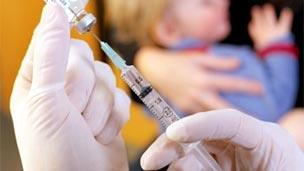Toddlers to get 'six in one' jabs
- Published

Different immunisations can be administered at the same time
Young children are to be immunised against six diseases at once, the Government has confirmed.
After their first birthday toddlers will be offered a single appointment to have three injections to guard against measles, mumps, rubella, two types of meningitis and a form of pneumonia.
This replaces the existing NHS policy for England and Wales of spacing the vaccines over a couple of months.
The change is designed to boost vaccination rates.
Writing to all GPs concerned, the Chief Medical Officer Professor Dame Sally Davies said, external the new policy should be "brought in as soon as practicable for your area".
Currently around 85% of all toddlers turn up to get immunised.
Boosting uptake
Although this is more than in previous years, experts are still having to work hard to get the figure up to the 95% level that is necessary to effectively stop the spread of the disease in the community.
The vaccination rate has been well below this level for several years, ever since the Lancet medical journal published controversial research about the MMR vaccine in 1998.
The study has since been discredited, but confidence has been slow to return in the combined measles, mumps and rubella vaccine.
Government advisors believe simplifying the immunisation schedule will help boost vaccine uptake by making it easier for parents to get their children vaccinated.
While some parents will welcome one fewer visit to the doctor, others may be concerned about exposing their children to so many vaccines in one sitting.
But experts say combining the vaccines should not pose any additional risk.
A Department of Health spokeswoman said: "Independent scientific research has shown that providing these vaccines at the same time is safe, effective and more convenient for parents."
Children will still be offered the usual series of baby vaccinations as well as their pre-school booster jabs after their third birthday.